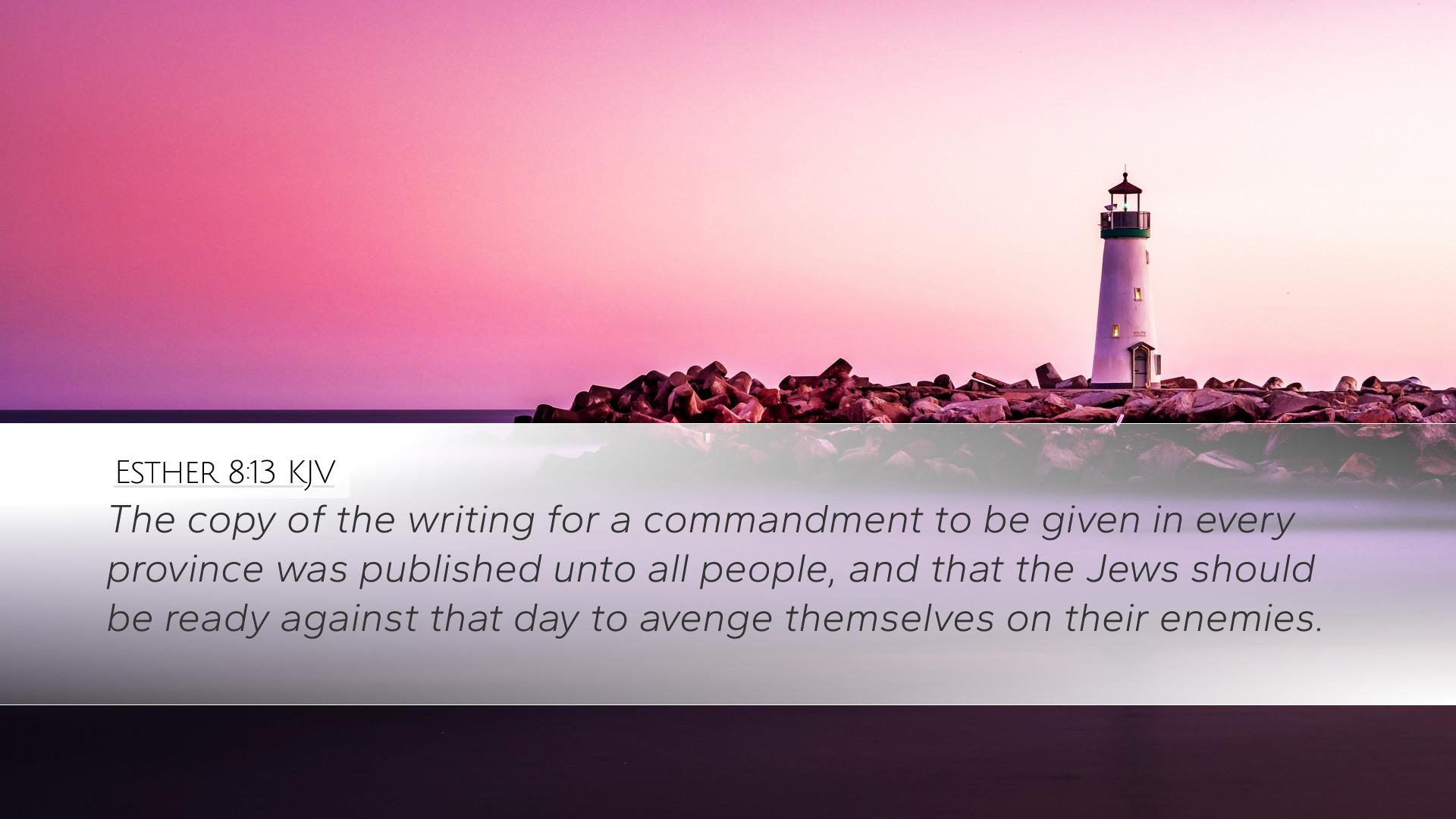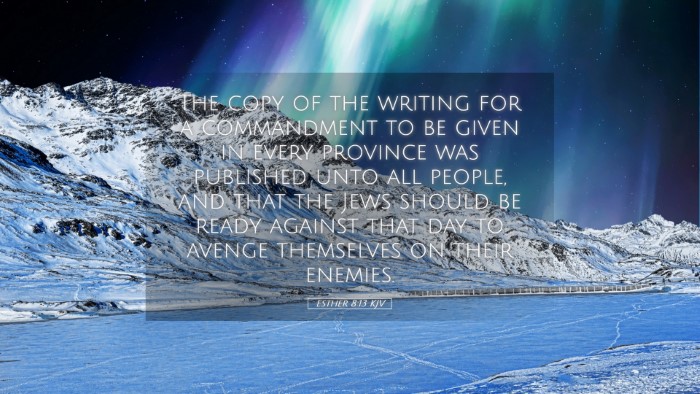Old Testament
Genesis Exodus Leviticus Numbers Deuteronomy Joshua Judges Ruth 1 Samuel 2 Samuel 1 Kings 2 Kings 1 Chronicles 2 Chronicles Ezra Nehemiah Esther Job Psalms Proverbs Ecclesiastes Song of Solomon Isaiah Jeremiah Lamentations Ezekiel Daniel Hosea Joel Amos Obadiah Jonah Micah Nahum Habakkuk Zephaniah Haggai Zechariah MalachiEsther 8:13
Esther 8:13 KJV
The copy of the writing for a commandment to be given in every province was published unto all people, and that the Jews should be ready against that day to avenge themselves on their enemies.
Esther 8:13 Bible Commentary
Bible Commentary on Esther 8:13
Verse Overview: Esther 8:13 states, "A copy of the document was to be issued as a decree in every province and published to all peoples so that the Jews would be ready on that day to take vengeance on their enemies." This verse follows the turning point of the narrative where the fate of the Jewish people shifts in their favor, highlighting themes of justice, divine intervention, and communal resilience.
Contextual and Historical Background
The Book of Esther unfolds during the Persian Empire, depicting the peril and deliverance of the Jewish people. Haman, the villain of the story, crafted a decree to annihilate the Jews. However, through Esther's courage and strategic advocacy, the Jews receive not only deliverance but an opportunity for defense.
Esther 8:13 serves as an important climax where the king's new decree contrasts starkly with Haman's original intent, underscoring a divine reversal.
Thematic Insights
1. The Theme of Reversal: The issuance of the new decree signifies a remarkable reversal of fortune for the Jewish people. Albert Barnes notes that such dramatic turns are frequent in the biblical narrative, illustrating God's sovereignty over human affairs.
2. Preparedness for Justice: The command for the Jews to be ready reflects a proactive stance in facing their adversaries. Matthew Henry emphasizes the importance of preparation in the believer's life—spiritually and practically. This readiness is multifaceted, involving prayer, unity, and strategic action.
3. The Role of Authority: The king’s decree symbolizes the governing authority backing the oppressed. Adam Clarke remarks on the significance of royal edicts in the ancient world, asserting that God can use human authority for the sake of His people’s salvation. It calls into question the responsibilities of those in power to uphold justice.
Exegetical Insights
The decree’s issuance is notable for several reasons:
- Divine Intervention: The transition from despair to hope illustrates God’s providence. As Henry points out, though hidden, God’s hand orchestrates the fate of His people throughout the narrative.
- Public Announcement: The decree’s wide distribution illustrates the importance of public knowledge in matters of justice. Clarke notes that the Jewish community's awareness empowers them to act decisively.
- Timing and Vengeance: The specific reference to being ready "on that day" speaks volumes about divine timing. Barnes observes that the timing of God’s deliverance often runs counter to human expectations, emphasizing faithfulness amidst trial.
Application for Modern Believers
Esther 8:13 extends beyond its historical context, offering significant applications for contemporary readers:
- Vigilance Against Oppression: Just as the Jews were encouraged to prepare against their enemies, believers today must remain vigilant against injustice and oppression, advocating for the voiceless and marginalized.
- Faith in Divine Timing: The verse inspires confidence in God’s timing and ultimate justice. Pastors and theologians can encourage congregants to trust that God can turn seemingly dire circumstances into avenues for redemptive victory.
- Unity and Community Action: The collective action of the Jewish people reflects the need for believers to act as one body, promoting unity in their efforts to combat injustice and share the Gospel.
Conclusion
Esther 8:13 encapsulates a crucial moment where hope replaces despair for the Jewish people. Through the combined insights of Matthew Henry, Albert Barnes, and Adam Clarke, this commentary highlights the theological and practical significance of the verse. It serves as a reminder of God’s faithfulness, the importance of justice, and the power of strategic action in the face of adversity.
As pastors, students, and theologians meditate upon this verse, may they feel the encouragement to respond actively to their contexts, trusting in God’s providential care as they engage with the challenges of their day.


